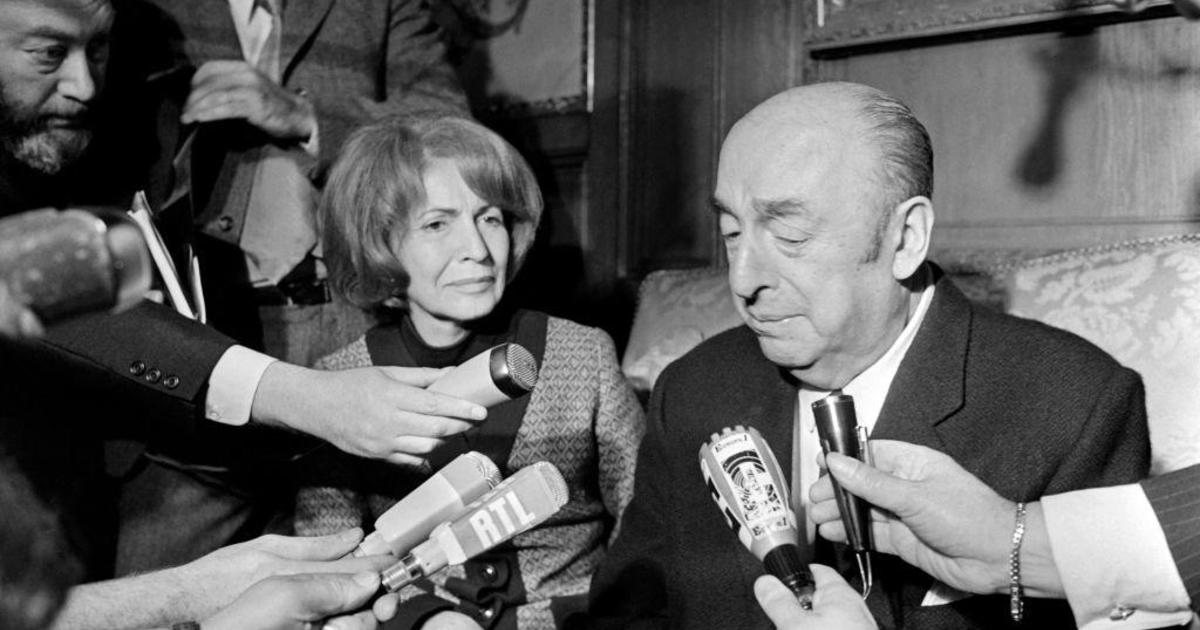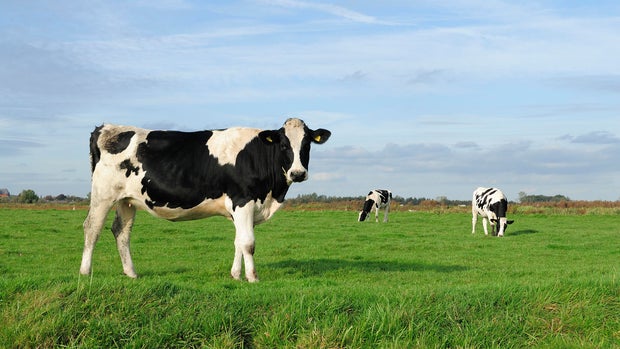CBS News
Inquiry into Pablo Neruda’s 1973 death reopened by Chile appeals court

An appeals court in Chile’s capital on Tuesday ruled that the case of Chilean poet and Nobel Prize winner Pablo Neruda’s death be reopened, saying the investigation has not been exhausted and new steps could help clarify the cause of his death.
Last December, a judge rejected a request by Neruda’s nephew to reopen the case to look for other causes of death than cancer, which is what is listed on the poet’s death certificate.
In February 2023, the nephew, Rodolfo Reyes, said forensic experts from Canada, Denmark and Chile had found evidence pointing to Neruda having died of poisoning more than 50 years ago.
Reyes said forensic tests carried out in Danish and Canadian labs indicated a presence in Neruda of “a great quantity of Cloristridium botulinum, which is incompatible with human life.” The powerful toxin can cause paralysis in the nervous system and death.
It was the latest turn in one of the great debates of post-coup Chile. The long-stated official position has been that Neruda died of complications from prostate cancer, but the poet’s driver argued for decades that he was poisoned.
In December, a judge ruled that the forensic results had already been carried out or were “late,” and didn’t lead anywhere.
Photo by AFP via Getty Images
Several years earlier, other international forensics experts had already rejected the official cause of death as cachexia, or weakness and wasting of the body due to chronic illness — in this case cancer. But at that time they said they had not determined what did kill Neruda.
On Tuesday, the appeals court unanimously revoked the judge’s resolution and ordered that the procedures requested by the nephew be carried out. These steps include a calligraphic analysis of the death certificate, a meta-analysis of the test results carried out by foreign agencies, and subpoenas for statements from Chile’s documentation project and an expert on Clostridium botulinum.
Neruda, a Communist Party member, died 12 days after the 1973 military coup that toppled the government of President Salvador Allende and hours before he was to leave Chile for exile in Mexico. The coup put Gen. Augusto Pinochet in power.
Neruda’s body was exhumed in 2013 to determine the cause of his death but those tests showed no toxic agents or poisons in his bone. His family and driver had demanded further investigation.
In 2015, Chile’s government said it was “highly probable that a third party” was responsible for Neruda’s death. In 2017, authorities reported the discovery of fragments of the Clostridium botulinum bacteria in his bone remains and in a molar.
Neruda was reburied in his favorite home overlooking the Pacific Coast.
Neruda, who was best known for his love poems, was a friend of Allende, who killed himself rather than surrender to troops during the coup led by Pinochet.
Neruda was traumatized by the military takeover and the persecution and killing of his friends. He planned to go into exile, where he would have been an influential voice against the dictatorship.
But a day before his planned departure, he was taken by ambulance to a clinic in Chile’s capital of Santiago where he had been treated for cancer and other ailments. Neruda officially died there Sept. 23, 1973.
But suspicions that the dictatorship had a hand in the death remained long after Chile returned to democracy in 1990.
During his life, Neruda accumulated dozens of prizes, including the 1971 Nobel Prize for Literature.
CBS News
Biden awards posthumous Medal of Honor to 2 Union soldiers

Watch CBS News
Be the first to know
Get browser notifications for breaking news, live events, and exclusive reporting.
CBS News
Avian flu confirmed in a Colorado farmworker, marking fourth human case in U.S. since March

A case of H5 influenza, also known as bird flu or avian influenza, has been confirmed in a man who was working at a dairy farm in northeastern Colorado. That’s according to the Colorado Department of Public Health and Environment, which said it is the fourth confirmed human case in the United States since an outbreak among cows that appears to have started in March.
VLIET/Getty Images
The man was working in Northern Colorado and had direct contact with cattle that were infected with avian flu. To this point, the only U.S. cases have been among farmworkers.
The CDPHE says the person who tested positive for the avian flu only had one symptom — pink eye, otherwise known as conjunctivitis. He was tested after reporting his symptoms and received an antiviral treatment with oseltamivir afterwards. Those are the Centers for Disease Control and Prevention’s recommended steps when there’s a confirmed human case. The man, whose identity is not being released, has recovered.
This is the first confirmed a case of avian flu in Colorado since 2022. CDPHE state epidemiologist Dr. Rachel Herlihy said the risk to the public is low.
“Avian flu viruses are currently spreading among animals, but they are not adapted to spread from person to person. Right now, the most important thing to know is that people who have regular exposure to infected animals are at increased risk of infection and should take precautions when they have contact with sick animals,” Herlihy said in a prepared statement.
Jill Hunsaker Ryan, the executive director of the CDPHE said “Coloradans should feel confident that the state is doing everything possible to mitigate the virus.” The guidance for farmworkers includes the recommendation that people shouldn’t touch animals who are sick or who have died. For people who must handle such animals, the following is recommended:
– Wear personal protective equipment that includes an N95 respirator as well as eye protection and gloves.
– Wash hands with soap and water afterward. An alcohol-based hand rub could also be used if soap and water is not available.
“We can make these recommendations, but I think all of us realize that this may be a bit challenging for workers to comply with that,” the CDC’s Tim Uyeki said at a briefing with rural doctors last month.
It is unclear whether the man was wearing personal protective equipment.
“Our partnership with the Colorado Department of Agriculture has been crucial in disseminating information to dairy farmers across the state,” Hunsaker Ryan said.
The three other confirmed human cases of avian flu since the March outbreak in cattle were found in Texas and Michigan.
Anyone who has been working with dairy cows and begins to feel sick with possible avian flu symptoms should call the CDPHE at 303-692-2700 during the day or 303-370-9395 after hours.
More information about avian flu can be found on the Colorado Department of Public Health and Environment’s website.
News of the case comes as federal officials are now debating whether and when to deploy 4.8 million doses of bird flu vaccine that are being filled into vials this summer. Finland announced last month it would offer shots to workers who might be exposed to the virus.
Vaccinating farm workers?
U.S. officials say manufacturing of the vaccines is expected to be done by August.
Vaccinemaker CSL Seqirus says it is still in talks with the Food and Drug Administration to clear use of their shots in humans. After that, it would be up to the CDC to decide whether to roll out the shots for farm workers.
“No final decisions are made, but we are in the process of robust discussion,” the CDC’s Principal Deputy Director Dr. Nirav Shah told reporters on Tuesday.
Shah said the vaccine debate hinges in part on whether more distribution of flu treatments might be a better alternative.
“If our goal is to reduce the number of infections that may occur, we have to wonder whether vaccination is the best route for that, or whether there may be other routes that are faster or even more effective such as, as I mentioned, more widespread use of antivirals,” said Shah.
Officials are also discussing other measures to help workers infected with the virus, Shah added, including the possibility of offering financial help with sick leave and further outreach.
Farm workers may also not be willing to get the shots, even if they were to become eligible for vaccination.
“If right now, H5 is not perceived as a pressing threat among farm workers, and I’m not speculating as to whether it is or not, but if that is the case, then uptake may not be robust,” said Shah.
CBS News
Iconic Texas painting saved from Goodwill fetches over $100,000 at auction

Nearly lost forever, a family heirloom painting turned out to be a Texas masterpiece and sold for six figures at Dallas-based auction house last week.
According to Heritage Auctions, the painting of Texas bluebonnets was loaded onto a trailer with donations bound for Goodwill, all belongings of a woman who was moving to the West Coast for retirement.
She had received it as a gift from an extended family member in Texas to commemorate her birth in 1922, according to the auction house. At the last minute, the woman decided “it was too pretty to surrender,” and she kept it.
After the woman died, her daughter kept the painting on display in her own home near Tacoma, Washington.
For years, no one in the family realized the artwork was an original by “the father of Texas painting,” Julian Onderdonk. The family recently made the discovery and decided to put it up for auction “to someone who will genuinely appreciate it,” the original owner’s grandson told Heritage Auctions.
On June 29, the painting, named “A Field of Bluebonnets, San Antonio” sold for $112,500. In the same auction, two other Onderdonk paintings sold for $106,250 and $93,750, respectively.
Heritage Auctions, HA.com
Who was Julian Onderdonk?
Onderdonk was born in San Antonio, Texas, in 1882 and showed artistic talent at a young age, according to the Texas Historical Society. He began teaching art as a teenager and later moved to New York City to study and teach.
In 1906, Onderdonk took a seasonal job organizing art exhibitions at the Dallas State Fair, now known as the State Fair of Texas. In 1909, he moved his family back to Texas, eventually taking an interest in painting bluebonnets and other Texas landscapes.
Onderdonk painted “A Field of Bluebonnets, San Antonio,” in 1921. He died the next year, at the peak of his success.
His work is on display at several museums, including the Amon Carter Museum of American Art in Fort Worth and the San Antonio Museum of Art.
Former President George W. Bush had several Onderdonk works in the White House during his administration, according to the historical society.












